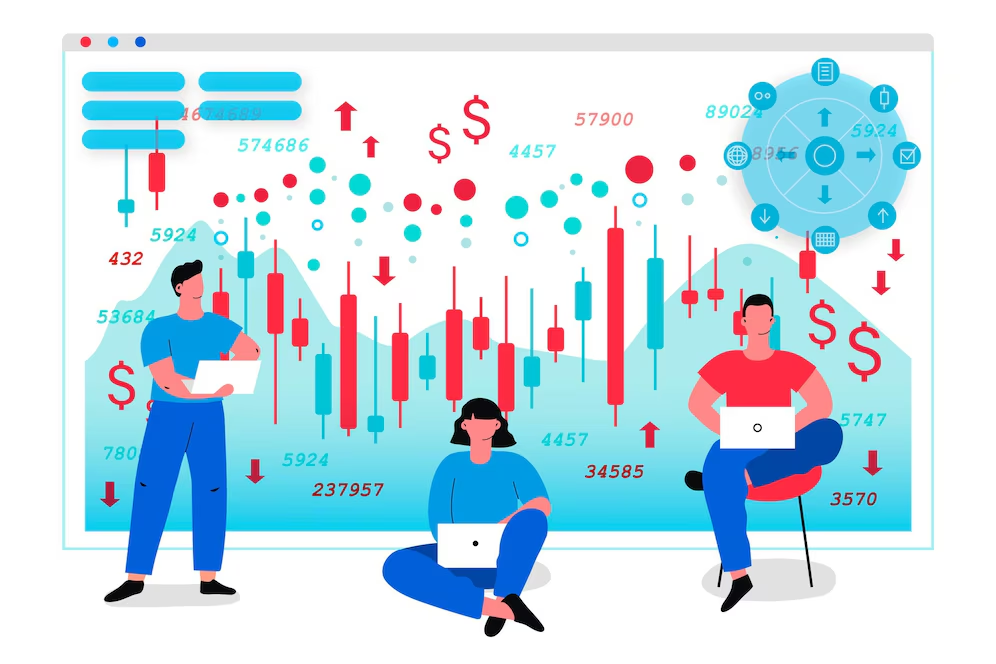The stock market has always been a space defined by volatility, opportunity, and risk. For decades, traders have relied on Fundamental and Technical Analysis, human intuition, and Financial Indicators to make decisions. However, the advent of “Artificial Intelligence (AI)” is transforming stock trading in unprecedented ways. “AI in stock Trading” has introduced smarter, faster, and more efficient methods to assess the market, automate trades, and make predictive decisions. Through this blog KStock Learning will give you the right and in-depth insights of “How Artificial Intelligence is Revolutionizing the Market”.
Artificial Intelligence has brought a paradigm shift to stock trading. While algorithmic trading has been around for years, AI takes it to the next level by making trading systems more autonomous and intelligent. In traditional algorithmic trading, predefined rules and historical data drive decisions. AI, however, leverages self-learning algorithms, “Machine Learning” models, and learning techniques to analyze patterns in real-time and continuously improve its predictive capabilities.
As of 2024, AI-driven trading represents around 60-70% of all stock market trading volume globally. This is particularly evident in High-Frequency Trading (HFT), where AI algorithms execute thousands of trades in fractions of a second.
The Evolution of AI in Stock Trading
Why AI?
AI provides numerous advantages in stock trading:-
Speed- AI algorithms can process massive amounts of market data in seconds, identifying opportunities faster than any human could.
Accuracy: Machine learning models reduce human error by spotting patterns and trends that are difficult for manual traders to detect.
Automation– AI can execute trades automatically based on preset conditions, eliminating the emotional biases that often affect human traders.
These features have made AI an indispensable tool in stock trading, especially for institutional investors and hedge funds.
Role of Machine Learning in Stock Trading
Machine learning plays a pivotal role in modern stock trading by enabling algorithms to analyze vast amounts of data quickly and accurately. Unlike traditional methods that rely on historical data and human intuition, machine learning models can identify complex patterns and trends within financial markets. By processing structured data, such as stock prices and trading volumes, alongside unstructured data, like news articles and social media sentiment, these algorithms can generate actionable insights for traders.
One of the primary applications of machine learning in stock trading is predictive analytics. Machine learning models can forecast stock price movements based on historical data, macroeconomic indicators, and market sentiment, helping traders make informed decisions. Techniques such as supervised learning allow these models to learn from past market behavior, continuously improving their accuracy over time.
Moreover, machine learning enhances risk management by assessing portfolio risks and optimizing asset allocation. By analyzing market volatility and correlations between assets, algorithms can dynamically rebalance portfolios to minimize losses.
As technology advances, machine learning will continue to evolve, offering even more sophisticated tools for traders. This integration of AI and machine learning is transforming how investors approach the stock market, making trading strategies more data-driven and effective.
Models of Machine Learning in Stock Trading
Supervised Learning: In supervised learning, models are trained on labeled data (e.g., past stock prices and company performance metrics) to predict future outcomes. For example, a supervised learning model might learn that when certain economic indicators rise, stock prices tend to increase.
Unsupervised Learning: These models analyze large datasets without predefined labels, allowing the algorithm to discover hidden patterns. In stock trading, unsupervised learning can identify clusters of stocks that behave similarly, aiding in portfolio diversification.
Reinforcement Learning: Reinforcement learning is a more advanced AI technique where the algorithm learns by interacting with its environment and receiving feedback. This is particularly useful in trading as the AI agent can learn optimal trading strategies over time through trial and error, much like a human trader but at a faster and more efficient pace.
Applications of Machine Learning in Stock Trading
Using the Machine Learning Language traders can easily Predict, Manage and Analysis the market trends. Let’s learn how
Price Prediction– By analyzing historical data, news sentiment, and even social media trends, machine learning models can predict future price movements. For instance, AI-driven models accurately predicted sharp market downturns during the COVID-19 pandemic.
Risk Management– AI can continuously assess and adjust risk exposure in a portfolio by analyzing market trends and volatility in real-time. Machine learning models can dynamically rebalance portfolios to minimize losses during market downturns.
Sentiment Analysis AI can process vast amounts of unstructured data, such as news articles, social media posts, and analyst reports, to gauge market sentiment and predict how it might impact stock prices.
Machine learning has not only transformed how traders analyze the market but also how they execute their trades.
Learn the AI Trading Platforms
AI trading platforms have become increasingly popular, offering both institutional and retail investors access to AI-driven trading tools. These platforms allow users to leverage advanced AI algorithms for market analysis, trade automation, and performance optimization.
Features of AI Trading Platforms
Automated Trading– AI trading platforms enable fully automated trading, where the system executes trades based on predefined parameters. This reduces the need for human intervention and allows trades to be made 24/7.
Real-Time Data Analysis– AI platforms process real-time market data, by offering instant analysis and trade recommendations. This Instant Real-Time Analysis allows traders to react to market changes before others. Addition of AI provides a competitive edge.
Backtesting– Traders can backtest their strategies on historical data to see how well they would have performed in the past. AI platforms use machine learning models to refine these strategies.
Portfolio Management: AI platforms assist the Portfolio Managers with asset allocation and portfolio rebalancing based on the investor’s risk tolerance, financial goals, and market conditions.
Name of the Popular AI Trading Platforms
Kavout- Kavout is a platform that uses AI and machine learning to score stocks and provide trading recommendations.
Trade Ideas– This AI trading platform employs AI to generate trading ideas and provide real-time alerts to the traders.
TuringTrader– TuringTrader is an open-source platform that enables traders to design, test, and deploy AI trading strategies.
These platforms are leveling the playing field, allowing everyday traders to leverage the same AI tools that institutional investors use.
How AI helps to make Trading Strategies
AI has enabled a variety of innovations for creating trading strategies, many of which outperform traditional methods. Here are the name of some AI trading strategies that are being revolutionizing the market:
High-Frequency Trading (HFT)- AI algorithms are executing thousands of trades per second for capitalizing on small price fluctuations. AI has the ability to analyze massive datasets in real-time which makes the HFT more efficient and profitable.
Algorithmic Momentum Trading– AI identifies stocks with upward or downward momentum based on real-time market data. The system then places trades to capitalize on short-term trends.
Sentiment-Based Trading– AI algorithms help traders to analyze news articles, financial reports, and social media sentiment to predict stock movements. This strategy is particularly effective in reacting to breaking news or earnings reports.
Pair Trading– AI pairs two related stocks (e.g., in the same sector) and trades based on their relative performance. When one stock in the pair underperforms, the algorithm buys it, expecting the gap to close.
Mean Reversion– AI algorithms detect when a stock has moved too far from its average price and place trades expecting the price to revert back to its mean.
Arbitrage Trading– AI identifies and exploits price discrepancies between markets or financial instruments to lock in low-risk profits.The speed of AI’s and efficiency make it well-suited for arbitrage opportunities that require split-second decision-making.
These AI-powered strategies mentioned above not only optimize trading but also reduce human error and emotional bias, helping the trader to lead and perform better.
The Most Important Future of AI in Stock Trading
The rise of AI in stock trading is just beginning. As Artificial Intelligence technology advances, we can expect to see more sophisticated models that can analyze even larger datasets with more accuracy. “Quantum computing” is yet to be poised to take AI in Stock trading to another level by processing complex calculations at speeds unimaginable today.
Additionally, AI will likely become more accessible to retail investors by leveling the playing field between Individual Traders and Institutional Investors. AI trading platforms will continue to improve in future with offering more user-friendly interfaces, better backtesting capabilities, and increasingly accurate predictive models.
Ethical Considerations
While AI has brought many benefits to stock trading, it also raises ethical concerns. The speed and automation provided by AI could lead to increased market volatility or manipulation if not properly regulated. Moreover, the use of AI could widen the gap between Wealthy Institutions with access to cutting-edge technology and smaller, Retail Investors.
Conclusion
AI in stock trading is revolutionizing the financial markets, offering unprecedented speed, accuracy, and automation. With Machine Learning in stock trading, traders can harness data-driven insights to predict market movements, while AI trading platforms provide the tools needed for automation and real-time analysis. From high-frequency trading to sentiment-based strategies, AI is reshaping how both institutional and retail traders approach the stock market.
As AI continues to evolve, it will undoubtedly play an even more significant role in shaping the future of stock trading, offering exciting opportunities and challenges for traders worldwide.



